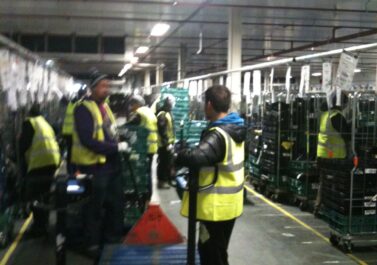Click for PDF here: angrywomen3
People with insecure immigration statuses are having an increasingly tough time. Many Brexit voters expressed a desire for tighter immigration controls and the referendum decision has given a mandate for the state to tighten their controls. This has not meant deporting more people though. Enforced deportations have actually declined since 2014. This is partly because voluntary removals have gone up, no doubt due to the increasing restrictions and lack of state financial help that forces people to leave ‘voluntarily’. At the same time, talking tough on immigration can be a smokescreen for not doing much on the ground. After all, the state needs such precarious workers as a pool of ultra-cheap labour that won’t make trouble. What is more important is not to round them all up and fly them out out of the UK immediately, but to have more control over them. Landlords, schoolteachers, doctors and employers are all being enlisted in this policing effort. The overall effect is an increasingly fearful and hostile environment, which spreads to the migrant low-waged sector in general, especially when workers witness the occasional immigration raid. But how much scope is there in the current situation for people with insecure immigration statuses to challenge it? As well as Kulbir’s account below, we can learn from collective actions of undocumented workers in the US or France.[1]
[1] http://en.labournet.tv/sans-papiers-occupy-temporary-work-agency-paris
*********************************************************************************
“I was born in the Punjab, in India, in a small rural village. My mother, father, brother and sister-in-law still live there. I have two brothers and one sister. I am the youngest. We did not have much money growing up. The fields and land around our village were owned by a landowner, who my mother (and occasionally me and my sisters) worked for. It was seasonal, labouring work. At harvest time I helped my mother cut the sugar beet, plus there were rice paddies and maize fields. My grandparents had also done this type of work.
My father was a policeman but was often absent from work because he was an alcoholic. This increased the pressure on my mother to bring the income from labouring in the fields. My parents argued a lot and he was sometimes violent towards her. I did not want this kind of life.
I was lucky because I was able to focus mainly on my studies. My older sisters did more of the housework than me. I started school at the age of around 6 or 7. I went to the local village school, which was a government school, open to everybody. I could walk there in 10 minutes, no problem. I was good at school and so when I finished high school I took the admission test for college. I passed and studied commerce at the college for three years. The college was in the city, so I travelled by bus for about one hour to get there. I graduated when I was 21 years old.
This is when I also got married. I wanted to be settled, plus I wanted to start my own life away from my quarrelling parents. My uncle, my mother’s brother, introduced my parents to my future husband’s family. They were a nice and respectable family with more money than my own family. I met my husband once before we got married. He seemed fine to me. We had the marriage in the gurdwara and a small party. I was excited about my future life.
Before I was married, I had already submitted my visa to study in the UK. This was my dream. And in a double stroke of luck, I got news that my visa had been awarded on my wedding day! So I only spent one week in my husband’s family home because after this we both flew to the UK. I was planning to study for an MBA at the University of X.
This was in 2009. My husband was able to come with me on a spousal visa, and at the time, this meant that while I studied, he was allowed to work full time. His parents had paid for my tuition fees which came to £8000 for the two-and-a-half year course. They also paid for our rent when we first arrived. A relative of my husband met us at Heathrow when we arrived. We stayed with them in Hounslow for a month and then found our own place in X.
I remember being nervous about our life in England. I studied English at school, but this was only one lesson in the timetable. The rest of my studies were in Punjabi. There was not much chance to practice speaking English so while my written English and grammar was very good, I could not express myself verbally. Luckily I was enrolled on a 6-month English course at the university before my MBA started so I was more confident in English when I started studying.
Our visa allowed me to work for up to 20 hours a week on top of my studies but I never found a job. My husband, through a friend, found a job in an Indian grocery store, which was full time. He was earning around £220 a week then. We rented a room in a shared house, all Indians. 8 people lived in a 3-bedroom house, I remember that there was one family also staying there, the rest were single men from India, all working locally. Although we lived in the same house, we did our cooking separately from each other. There were never any arguments about housework – we all took turns to clean the kitchen and bathroom. We paid £350 a month rent in this place.
As my course came to an end I gave birth to my daughter. Because of this I was able to extend my student visa for 7 months while I stayed at home to look after my baby. I did not receive any maternity pay or anything like that, I did not know if I was entitled to maternity pay or not, there was nobody to ask. Anyway, we were able to survive on the pay of my husband in the grocery shop.
We returned to India to visit our families with our new baby. We spent two months there but my husband and I were quarrelling. After my course had finished, we could apply for a two-year work visa. He thought we should use the visa to the maximum and that we should both work full time in the UK to make as much money as we could. I also wanted to work but it would not have been possible with a baby. We did not have any family in the UK and there was nobody to look after her. The only way it was possible was if we left our daughter with her grandparents in India. They agreed, thinking that even though they were quite old (my husband’s mum was in her late 50s and his father was in his mid-60s), it would only be for two years.
So we returned to the UK, without my baby, and moved to X. I found a zero-hours job, picking in a chill warehouse for a big supermarket chain. It was cold and sometimes they cancelled my shift at very late notice, even when I was on my way to work! A friend of mine was a manager in this warehouse so that’s how I found out about the job. My husband found a part-time job in an industrial bakery. We found another room in a shared house nearby. It was a 3-bedroom house, with 6 people living there, all Indians again. We spoke to each other in the kitchen, everyone was working in similar types of jobs, through temp agencies or in construction. None of them wanted to go back to India. Everyone knew this was there chance to make some money and even though the work here was hard, they thought it was still an easier life than they would have in India. All the landlords, who owned and rented out quite a few properties, asked to see our passports and visa when we moved in.
We used the services of a local visa agent to get our two-year work visa. There are lots of visa agents and immigration solicitors around here, and I thought I could trust him because he was a professional – he had his own office, he had the correct qualifications and many people used his services because he could also speak punjabi/hindi. His website also said he was endorsed on a Home Office list. We paid him £10,000 to arrange IT training at a company that would then sponsor my visa application. But I only got 2 weeks training, and was then given fake documents to apply for a visa. I thought he could help me get my visa legally but he was only after our money. He thought he could get away with it, that we would not make a fuss. But I did not let him get away with it. I went to his office so many times to complain. Eventually he agreed to give us our money back. He wrote us a cheque. But straightaway afterwards he called the bank and said his chequebook had been stolen so when I went to cash the cheque, the bank thought I was committing fraud and froze my bank account! I talked about the situation with my friend at work in the chill warehouse. By this point, I was very stressed and was not sure what else to do. She said she could bring a group of friends to his office to put pressure on him to give back the money. So we all went, there was about 10 of us, including a local catholic priest! We refused to leave until he agreed to pay back the money. He was shocked and nervous and wanted to get rid of us. He tried to scare us, and when that did not work, he tried to be nice and make promises. In the end, because we were causing him such embarrassment he ended up paying all the money back over the next two months. It was such a relief.
After all this, we submitted our own visa application. But it was rejected. They immediately took away our right to work. We had to go and sign on at the immigration enforcement office once a month. They said that if they caught us working they would deport us immediately. But if we were not working, what were we supposed to live on?
When we submitted our visa application independently after the visa agent had ripped us off, I decided to get pregnant again. I thought we would get our visa and everything would be okay. I was getting older and I wanted to complete my family. So it was very disappointing to have our visa rejected. Because we did not have leave to remain, I was not entitled to free healthcare. New rules mean that I had to pay £4000 to have my baby delivered in the hospital. I agreed to a repayment plan. They wanted me to pay £100 a month. I said yes but then when they said we could not work in the UK, there was no way we could pay this. I said, look, all I can pay is £20 a month. They refused. They sent me so many letters, but I stood firm. I cancelled the direct debit so they were getting nothing at all from me. They had their own targets: they wanted people to re-pay their debt within two years. But I could not do this and kept saying we could only pay £20 a month. In the end, they agreed.
Now obviously we have to earn money to survive. The three of us – me, my husband and my baby – share one room in a house where 10 people live. We pay £420 a month for the rent. The landlady make a lot of money from renting this house out to so many people but even so, she is stingy about the amount of heating we use. In the end, because she was using this as an excuse to keep putting the rent up, we said, fine, put a lock on the boiler cupboard door so that you know we are not using all the gas. So now we have a lock on the door of the boiler – we have heating for one hour in the morning and one hour in the evening. I have had many arguments with this woman but at the end, I know it would be difficult to find another place to live with a baby that we could afford…
Me and my husband both have cash-in-hand jobs. It is the only way we can survive here while our other visa application is being processed. Because my husband works nights though, it is difficult to share the room all three of us. He has to get some sleep during the day and this is very difficult with a small child. Somehow we are coping though… I also have a job, working as a cook for a couple in a private household. They pay £10 an hour and I do 2 hours a day for them. In India this would be looked down on – a woman like me, working as a domestic worker? No way! People would look down on it. But here, I can do it. It is a pretty easy job, and it allows me to have my own money, to spend how I want. This is important to me.
The immigration department might say no to our visa application again but we wait and hope that this time they will say yes. I have not seen my daughter since we left her with her grandparents in India when she was almost 1 years old. She is now 7. We talk on whatsapp, she knows she has a baby brother but she has never seen him. She says she wants to come to the UK and be with us but we cannot leave the UK unless we don’t want to come back. And I don’t want to leave. Of course, it is always a worry in your mind, that we cannot legally work, that we might be deported, but at the same time, I still feel more freedom here than in India. I hate the Indian mentality, people always caring about what other people will think, having to always justify where you are going, what you are doing. Here, I don’t have to do that. I can work, there will be a good school for my child, there are activities for him to do here, we can earn money. I want to study IT. I can have a future here, but not having the right to work makes everything harder.
What have I learned about being in England? I have learned to be independent, to be self-sufficient, to earn my own money. I have realised my human worth. I work honestly and hard. But I have also learned that you cannot trust everyone. Like the visa agent. That was a big shock to me – that people like that can trick people and make lots of money and think they can get away with it. But I can fight back. Why? Because I know I haven’t done anything wrong. I believe in myself.”



